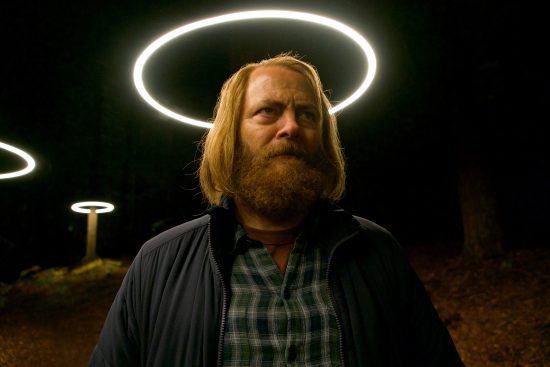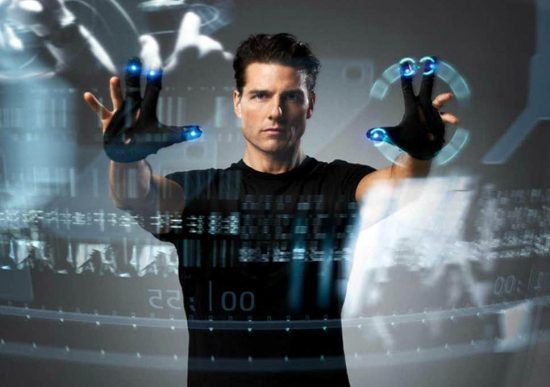Devs – A closer look at the Alex Garland TV show
This is an opinion piece about the Devs TV series and contains spoilers for the show from the start, as well as spoilers for other movies (with warnings in the text).
This is a critique, not a review. If you’re looking for a review of Devs, my advice is you should certainly watch it. Afterwards, come back here and argue with me. It’s an intelligent, enjoyable, interesting meditation on grief, power, love, technology and quantum physics. It is typical of the wonderful audacity of the peak TV era. It’s written and directed by Alex Garland, the guy who wrote the book that every Gen X’er read in the Nineties (The Beach). He then went on to write 28 Days Later and give us some great films: Dredd (outstanding fun), Annihilation (a must-see) and Ex Machina (very good). He also wrote Danny Boyle’s Sunshine, and while I don’t care for it, a lot of people love it. God knows I’d sooner have a divisive movie like that than the homogenised crap that makes up so much of Hollywood’s output. So, Devs is highly recommended. The complexity of the storyline means everyone will have their interpretation, all of which are valid to some degree. It’s high praise to say the series is worthy of debate, and I want to put an opinion out there.
That opinion is that the series was good, but it narrowly missed out on being great. The short version is, he didn’t land the ending. The long version (with spoilers for another movie which gives away the plot of Devs…) it suffered from the Minority Report problem.
Minority Report was a great film, close to being perfect. But… it dropped the ball at the end.
The core premise behind both the film and the story that it’s based on is that the future can be predicted. That goes to the core of Tom Cruise’s character, John Anderton, who fundamentally believes in his ‘Pre-Crime Unit’ and has built a successful career on it. He is saving lives with this technology.
The film’s internal logic says he will kill his preordained victim, Leo Crow. Therefore, the scene when Anderton holds a gun on Crow, amongst an ‘orgy of evidence’ that Crow murdered Anderton’s son is the film’s emotional peak. All of Tom Cruises’ considerable acting skills pour into that scene. When Anderton reads Crow his rights, choosing to arrest, rather than kill him, character meets plot and the story elevates to be as good as it possibly can.
But… instead of ending it there, we get a Hollywood ending, so Max von Sydow (RIP) who always played the bad guy in Hollywood movies is revealed in a ‘twist’ to be the big bad and the perfect ending is flushed down the toilet. We’re told that the flaw in the Pre-Crime system is that would-be-murderers who learn what they are meant to do can choose to change their fate. But we have already had the perfect scene for that when our hero chooses to do the right thing, as all good heroes do. Everything that comes after that is pants.
Devs ending is vastly superior, but the moment where character and plot meet most interestingly is similarly wasted. The Devs system, we learn, is a quantum computer with a prediction algorithm based on a huge amount of data. Therefore, it can predict events forward and backwards in time with perfect accuracy. The protagonist, Lily, is investigating the murder of her boyfriend, on the orders of Devs’ creator, Forest, played by Nick Offerman. His whole purpose in creating Devs is to ‘resurrect’ his daughter, killed in an automobile accident when he insisted that his wife – who was driving – continue speaking to him on her cell phone. There is a moment in one of the episodes where it’s explicitly pointed out that he is seeking absolution. In a universe where your fate is inevitable, he could not have saved them. But what if, either on a simple or quantum level, his actions caused the death of his family?
The writing doesn’t directly dwell on fate, other than to say Lily will inevitably visit the lab at a certain time, but it certainly implies Forest seeks absolution through his beliefs. It is most interested in determinism and many-worlds theory, where all events are not just possible, but all events happen in an infinite number of separate timelines. Forest explicitly rejects the many-worlds theory in one scene.
So, this character monomaniacally created a god-like computer system because of grief at his actions. He sees the future and fundamentally believes that nothing can alter it. That has implications for what happened to his family; the moment when Lily ‘changes’ the future that he has seen and so fervently believes in could have been the perfect distillation of eight hours of drama. It should shake him to his core… everything he has done has to be questioned at that point.
True, this is a story much more interested in ideas. The ending with avatars living in a perfect facsimile of blissful reality chimes with the simulation hypothesis, a rather hopeful theory that Professor Brian Cox has said he found impossible to disprove.
But it feels a little tacked on, a little artificial. Okay, the Forest we see on the visualisation screen is a recreation of the Forest from the real world. But how does he interact with his observers? None of the other recreations we saw did that.
More importantly, it feels like a missed chance with clear echoes of Minority Report. When Forest sees Lily defy the predictions of a machine which he believes in so much that he has killed for it, character and plot could have collided in perfect drama.
Contrast the ending of both Devs and Minority Report with the film that, in recent times has had the most outstanding ending, Inception. The final scene of that movie is perfect, marrying themes, plot, and character. Our hero gets everything he wants; he crosses oceans and spends immense time trying to achieve this… dream. But is it real? Is it even what he wants when the film has shown us that desires can be implanted? All of this is condensed into a simple image. It is perfect cinema. Hell, it is perfect recursion; cinema and dreams being a perfect romance.
Inception is a demanding standard. Even Chris Nolan has struggled to match it. The ending of Devs is frustrating but is an excellent attempt. For now, Annihilation remains Garland’s masterpiece.
But you don’t need precognition to see that he’ll do more amazing work.
For more of my ramblings, check out FiskFilm or Medium.














Long drawn out shite
Long, yes. Drawn out? Yes. A little self-indulgent? Yes.
But objectively shite? No, I really don’t think so. And besides, as I said in the article, I’d sooner watch shite from Alex Garland than a lot of the stuff that gets churned out by Hollywood.
I reckon it’s always better to be divisive than bland.
I can certainly see why people got frustrated with it… could easily have been a couple of episodes shorter, for sure.
There was some good stuff in it though, but I could help but expect Nick Offerman to start going on about meat and whiskey … “In time you may become men, and perhaps, even, Swansons..!”
For sure… it’s hard to watch Offerman without thinking of Swanson!